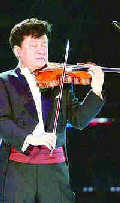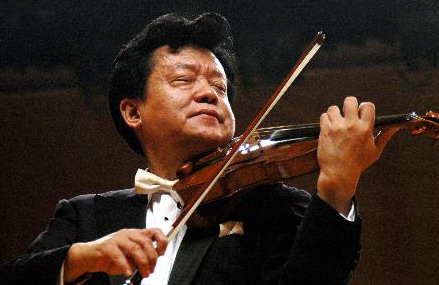 Dubbed an outstanding musical performer, the most charming violinist and a Chinese Menuhin internationally, Sheng Zhongguo is one of China's most well-known violinists. Sheng, who won international praise for Chinese violin performances, was invited to give recitals all over the world and to perform with top conductors and musicians. Sheng's gramophone records, CDs and tapes were warmly received both at home and abroad and his name was added to the list of the Greatest Artists of the World by an Australian broadcasting station. In 1986 and 1991, he was invited to be a member of the review committee in the International Violin Concours held in Japan and the United States. Sheng is now a member of the national committee of the Chinese People's Political Consultative Conference, member of the Central Committee of the China Democratic League, member of the council of the Chinese Musicians Association, member of the council of the Chinese Symphony Development Foundation, and so on.
Dubbed an outstanding musical performer, the most charming violinist and a Chinese Menuhin internationally, Sheng Zhongguo is one of China's most well-known violinists. Sheng, who won international praise for Chinese violin performances, was invited to give recitals all over the world and to perform with top conductors and musicians. Sheng's gramophone records, CDs and tapes were warmly received both at home and abroad and his name was added to the list of the Greatest Artists of the World by an Australian broadcasting station. In 1986 and 1991, he was invited to be a member of the review committee in the International Violin Concours held in Japan and the United States. Sheng is now a member of the national committee of the Chinese People's Political Consultative Conference, member of the Central Committee of the China Democratic League, member of the council of the Chinese Musicians Association, member of the council of the Chinese Symphony Development Foundation, and so on.
Sheng's performance style is filled with enthusiasm and poetic charm and he is outstanding in both technique and musical accomplishments. Sheng's repertoire includes classical and modern sonatas, concertos and exquisite musical sketches from various periods, as well as famous Chinese traditional songs. By combining music with life, Sheng's performances are imbued with true feeling and artistic appeal.
Sheng's sculpture, which is 2.5 meters high, was erected in his hometown in Hubei Province bearing his words: Music is the most beautiful language of human beings.
Sheng was lucky to grow up in a family full of this beautiful language. His father, Sheng Xue, was a famous violinist and professor who taught at the Central Conservatory of Music and Nanjing Arts Institute. His mother, Zhu Bing, majored in vocal music. Among their 11 children, 10 majored in music and nine of them are violinists. In the spring of 1984, 12 violinists of three generations in this family performed together in South China, which caused a sensation. As the eldest child, Sheng was born in 1941 during a very turbulent period in China. His parents, who, like most Chinese, harbored the desire for their country to be powerful, named him Sheng Zhongguo (mighty China).

At the age of five Sheng began to study the violin under his father. Two years later, he gave his performance where it was determined that he was a child prodigy. In 1954, Sheng enrolled at the affiliated secondary school of the Central Conservatory of Music with the highest grades. He often gave concerts and his records were often played by broadcasting stations. At the concert honoring Mozart's 200th anniversary, Sheng successfully performed the first chapter of Mozart's A Major Violin Concerto. During National Music Week in 1954, in cooperation with the Central Conservatory of Music orchestra, Sheng performed the F Major Violin Concerto, which was very well received.
In 1960 Sheng was sent to the Chaikovsky State Conservatory of Music in Moscow to learn from the world-famous violinist Leonid Kogan. There, Sheng won a prize at the Chaikovsky International Violin Concours, becoming one of the youngest violinists to win an international musical concours. In cooperation with the Shanghai Symphony in 1963 Sheng held a Concerto that was unprecedented in Chinese violin performance history.
Returning home in 1964, Sheng gave a series of performances both home and abroad. Although Sheng could not perform during the Cultural Revolution, he never ceased his pursuit of the art of music. After 1978, Sheng held over 100 concerts a year, becoming the most popular violinist.
Sheng was the first to give a performance in 1978 after the Cultural Revolution, and was invited to perform in Hong Kong and Macao. He once cooperated with the world's top violinist Menuhin, performing Bach's Duet Concerto of Violins. Menuhin praised Sheng as his best partner in China to perform Bach.
Since 1987, Sheng has held concerts in Japan every fall, donating part of his income to medical foundations for students abroad. The Japanese government awarded Sheng with the Cultural Ambassador. Due to his outstanding contributions to Sino-Japan cultural communications, Sheng was honored by the Japanese government in 1999. He met his Japanese wife there who was a famous pianist. The couple has held series of concerts together since 1987.
In 1999, Sheng performed in New York, Los Angeles and three other American cities where he was warmly received.
Sheng signed contracts with many foreign producers, greatly promoting world cultural communications. In addition, Sheng often gives speeches at universities with great enthusiasm. He believes that an outstanding nation should have all the best things in the world. Sheng takes pride in the many talents he discovered at the Youth Amateur Violin Concours over 10 years, an institution he funded.
Although 50 years have passed, Sheng still defined himself as a pilgrim of the palace of music. He said: Music is for sacrifice rather than profanation.
